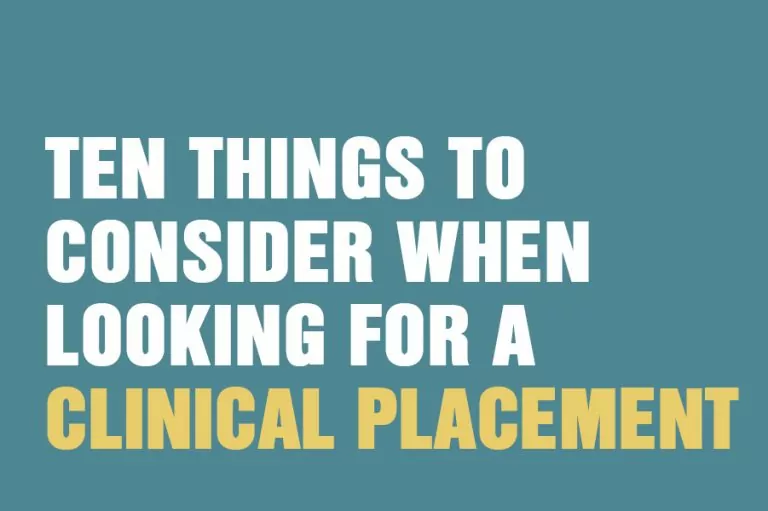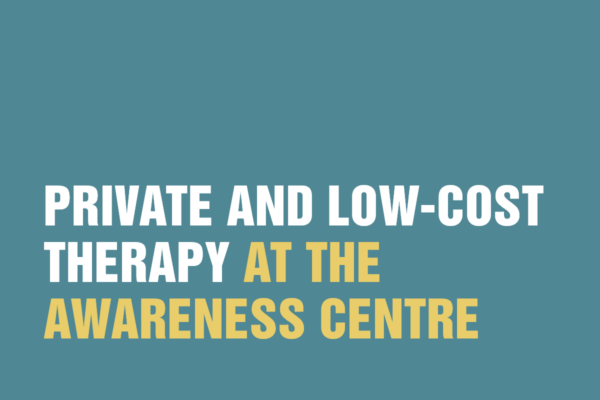Being a counselling/psychotherapy student can be a lonely and scary world. You have no social life, are up to your eyes in college, counselling, supervision, essays, case studies etc… and on top of that, the pressure to find a clinical placement that provides you with the hours, experience and the satisfaction that you need, can be a tricky business.
That is precisely why this year I was so happy to have found a professional and inspiring placement at The Awareness Centre (TAC) in Clapham. My experience at TAC has for me been an extremely positive one. I like to think of it as my ‘final year’ reward – the point when you have enough client hours to seem competent; you feel more experienced, which also means you probably have more confidence. In other words, you have that elusive magic that only a final year student can have (apparently!).
However, not everyone is so lucky with placements. And in the first year of training it seems to be becoming even more difficult to find an adequate placement. In fact, it’s not been unusual for me and my contemporaries to be swapping horror stories, ranging from nonsensical procedures (or even worse, just no procedures), to impatient, judgemental managers (counsellors themselves, hmmm), to the more comedic yet equally depressing tatty rooms and moth eaten consulting chairs!
Maybe this is to do with the profession not being regulated: or to put it more specifically the confusion that exists around regulation. There is general disagreement on the subject, which clearly leads to a mystification when it comes to what should be offered to placement students.
BACP provides the groundwork for ethical guidelines which organisations can choose to follow, and can show their dedication to this by joining up as a member. But this is by no means a requirement; posing a question about what this means for placement students, and the impact it can have on their work with clients – particularly taking into account their own levels of stress resulting from a potential lack of support.
In the medical world, and related health care professions, regulation for students seems to be tight. A fact I witnessed when my sister did her specialist placement in optometry at a leading NHS hospital (ten years on, she still works there). In fact, we were talking recently, and she was affirming this to me, stating, that there was regular external assessment of the placement to support the students in the best way possible. It struck me that there was the notion that patients, practitioners and the organisations were inextricably linked, and so to me, placements should provide a safe, rewarding and learning experience in return for hard work and dedication to the clients and organisation on behalf of the practitioner.
The other point when it comes to placement is the student’s role. People have varying degrees of motivation and when it comes down to it, the lessons learnt in finding a placement, often is a therapy in itself! Believe me, I’ve heard all the tales under the sun, by this I mean, linguistic metaphors of self-sabotage, procrastination, perfectionism… the list goes on! And I would be lying if I said I hadn’t had my own issues to confront, to coin an Oscar Wilde phrase: “I have very simple tastes, I am always satisfied with the best”, comes to mind! But when I pull myself back down from the ceiling, I ponder on what the happy medium is for a ‘good’ placement? So, I had a think about some of the things that I have experienced in my time as a trainee, and from that have put a list together of things that I think really matter when it comes to placement. I’ll start with my experience and observations of my current placement at TAC.
Living around the corner, I was not a stranger to TAC having visited it previously for other alternative therapy. The centre’s principle is:
“to combine and integrate the principals of conventional and complementary medicine and clinical therapeutic practice”.
It certainly does that. I think there is collaboration, not just of different therapies, but also between different minds and practices which builds a reputable and stimulated environment. The MD, Michaela McCarthy, is an impassioned person who embodies what she believes in. There’s no doubt that her vitality and spirit makes TAC what it is.
So, I sent my CV off ,and after the usual protocols of phone interviews, face to face interview and all the other important information they need to know, like what animal you would be if you could (I’m not being flippant… come on, it’s a classic!), I was very happy to be offered a place.
Given that TAC runs the NHS counselling in a variety of different surgeries in Lambeth, the placement has given me great experience of different issues/themes in a wide-range of clients. It’s also been rare to find a placement that also offers the opportunity of working with both short-term and long-term clients (through their Low Cost Counselling schemes), giving you an excellent idea of the differences between time-limited work and open ended. I find the rooms are tailor-made to provide the most comfortable experience for both client and practitioner, and having been fortunate enough to work in the centre itself and also at one of its partnered doctor’s surgeries I have had invaluable experience of different settings.
TAC is also versatile enough to act as a peaceful, healing, and community based holistic centre, in addition to a business, and has given me a lot of insight into social enterprise. The dichotomy between giving because you care, and, the idea of making money, hits on a question that I think runs deep into the world of therapy – exactly how you combine your therapeutic practice with a profit making employment. It is however something we all, as trainees have to consider, particularly if we want to enter the world of private practice.
But in addition to the above, there are many more important and more subtle features to what makes a good placement.
Here are my top ten tips of what to look for and/or consider:
1. Support
That’s different to being babysat… in fact, I like a good deal of autonomy when I’m working, but one thing is for sure, if something crops up that I need help on, the support needs to be there. Of course, it’s also worth mentioning that we as counsellors, have our own life issues going on, and in addition to support from supervisors, therapist and colleges, to feel supported by your placement and that you are able to talk to them is paramount.
2. Ethical frame-work
This underpins a lot of what the BACP considers at the heart of the profession. As a trainee, you are learning how to be an ethical practitioner, and being able to learn from example in your placement is the best way. The BACP’s ethical guidelines focus on the values, principals and personal moral qualities of counsellors, and so too it seems that organisations working within the profession should honour this ethical ethos.
3. Workable and unequivocal policies
To be honest, I am not a fan of the kind of 20th century attitude which insisted on business’ producing policy for policies sake, because of course, there needs to be common sense and sometimes we do just have to use our brains rather than bureaucratic bits of paper to move forward. However, in counselling, policy and procedure really is at the forefront. Knowing where you stand, who does what, and leaving no room for misinterpretation, is pretty important when you are dealing with vulnerable people. So, for your protection, your client’s protection and the organisations peace of mind, this is essential. So is the way they are communicated.
4. Clear communication
5. Free fortnightly supervision
6. Training
Whether it is induction training or more, training can be useful to keep you motivated and on the ball. Also, it’s useful for continuous development in your role.
7. Getting clients
Don’t get me wrong, you can’t always be full, and if you are continually not getting clients at a certain point, it may be worth considering whether you are putting something out in the world which is affecting this. However, the placement cannot be completely absolved of responsibility for giving you a fair amount of clients. In the past, I have wished that more honesty at the point of interview was exacted about the average amount of clients using the service (simple maths can then be used to decipher if that is going to work for you as a placement counsellor, which leads me onto my next point…
8. Location
This is one for the student to consider. If you spend more time travelling, than you do seeing clients, it’s probably not that conducive to your own emotional levels, by this I mean FRUSTRATION! Another point is if you are trying to run across London from Catford to Kensington 3 times a week in ½ an hour, apart from probably being socially confused, your energy levels are likely to be severely affected!
9. Hard work and dedication
This is another one for students… you can’t expect everything from a placement if you are not prepared to put in the work. Placement is a learning experience, and what you get in learning from the placement should be given back by you in a mature and professional manner. So, making sure you follow the rules, keep up to speed with procedure (including any changes in brought in) and be precise and trustworthy with paperwork, asking your supervisor if you are unsure of anything – like you would with clinical work. And so, last but not least…
10. Feeling valued
Well, not just in placement but in any job! If there’s mutual respect between worker and manager, I think you are onto a winner
I believe it’s very important for counsellors and therapists to have open and frank discussions about ongoing issues within our profession (we expect our clients to be open and truthful so why not us!). So what do you think is important in placements, and what has your experience been? Do you think this differs if you are a student, or a qualified practitioner working towards accreditation? Post your comments below and let’s get a conversation going.








5 Comments. Leave new
Although not a counsellor, I work with vulnerable young people and so undergo supervision with my line manager on a (semi) regular basis – I think what you say at the end about being open and honest with each other, within your profession is something that is so important, and something that is not often practiced.
I know from my own point of view, my relationship with my manager, is more of an unequal one – and I am not sure if this is through my own doing, or a cultural thing within my organisation, but, whilst I can discuss issues I am having with clients, with my manager, it is a whole different matter, discussing issues with colleagues and managers that may have an impact on my performance.
I think creating that open and honest, and most importantly, non-judgemental, atmosphere, within supervision is often the key to a successful placement; where you are free to say how you really feel and not abridge it, or tone it down for fear of speaking up against your seniors. Maybe this is my issue and how I see management, but I also think there is a lot to be said for your managers making you feel as though you can say if there is something about them that you would like to raise.
I also have been extremely lucky when it comes to finding a placement and I am grateful that my experience has been a positive one. West London Centre for Counselling has definitely set a high expectation for any ongoing placements I may take on. They are supportive, well organised and have a consistent flow of clients to name but a few of their good points.
I feel that the lack of counselling regulation in the industry does create some confusion and it can possibly allow organisations and trainee counsellor’s to offer an inadequate counselling experience. I believe that it is only fair to the clients and to the trainee counsellors (who dedicated and hardworking) that the placement does provide that safe, rewarding and learning experience that you mentioned Caz.
Personally, I do not think that it would differ according to whether you are a student or a qualified counsellor working towards accreditation but I would hope that the individual practitioner would take some responsibility as well in ensuring that the placement they accept and the standard of counselling they offer is up to scratch.
dear Caz
I can totally relate to your story and the points you make at the end are all very real and valid. I am a trainee systemic psychotherapist in my third year and find it difficult finding the right placement bearing in mind the things you mentioned in your story. I am available in the evenings if your organisation needs a lovely systemic therapist!!
Thank you for your comments. If you are interested in a placement at TAC please visit the Clinical Placement page on the website for full details. You can send your CV to [email protected]
Hi Ada. If you are interested in a placement at TAC please visit the Counselling Placement page on the website for full details.